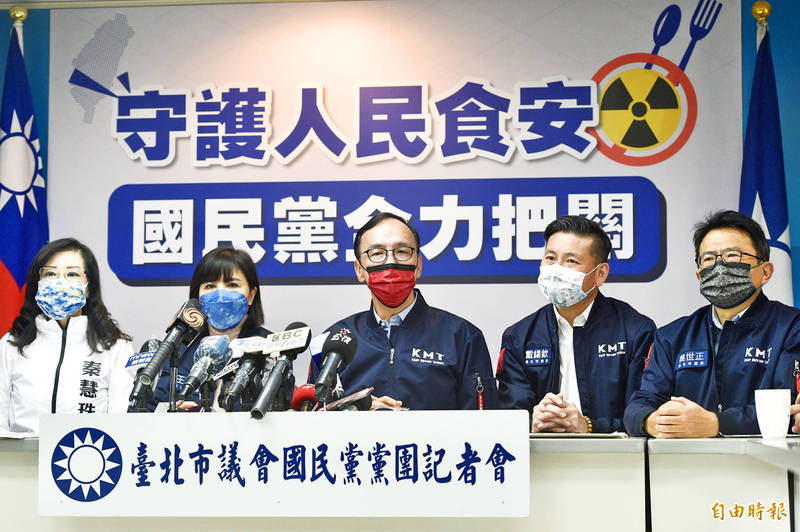《TAIPEI TIMES》 KMT seeks to rally support to keep Japanese food ban

From left, Chinese Nationalist Party (KMT) Taipei City councilors Chin Huei-chu and Wang Hsin-yi, KMT Chairman Eric Chu and KMT Taipei City councilors Dai Hsi-chin and Wu Shih-cheng attend a news conference in Taipei yesterday. Photo: George Tsorng, Taipei Times
By Yang Hsin-hui and Jake Chung / Staff reporter, with staff writer
Chinese Nationalist Party (KMT) caucuses in 22 cities and counties yesterday jointly declared that they would defend the nation’s food safety, as KMT Chairman Eric Chu (朱立倫) called for changes to the School Health Act (學校衛生法).
President Tsai Ing-wen’s (蔡英文) administration is failing to uphold food safety by lifting a ban on most food imports from five Japanese prefectures implemented after the 2011 Fukushima Dai-ichi nuclear power plant disaster, Chu told a news conference in Taipei.
KMT caucuses held similar news conference across the nation.
The government on Tuesday announced that it would end the ban on Feb. 28.
Ensuring food safety is a basic task of the government, and the KMT has worked to uphold the public’s right to clean and safe food, but the party has been accused of “not loving Taiwan” because it opposes lifting the ban, Chu said.
Local ordinances and the School Health Act should be amended to ban any foods containing residual radiation and prevent children from ingesting such food, he added.
Chu said that although the Democratic Progressive Party has claimed that existing laws are sufficient, Article 23 of the act stipulates that local produce should be prioritized, but does not say it should be the only source of food for schools, which provides a loophole to use food produced from areas affected by the nuclear disaster.
The Executive Yuan saying that local governments cannot implement stricter food safety regulations is the death of autonomous local rule, he said.
Local governments should enact legislation to offer food safety protection in areas where the central government’s laws fall short, Chu said.
Amicable Taiwan-Japan ties should not be a reason to import Japanese goods without question, nor should the government cite its application to join the Comprehensive and Progressive Agreement for Trans-Pacific Partnership as a reason to end the ban, he said.
Chu said that he had discussed the issue at length with New Taipei City Mayor Hou You-yi (侯友宜), who alongside other county and city KMT leaders agreed that taking a stand against the government’s Japan import policy was necessary.
Premier Su Tseng-chang (蘇貞昌) yesterday said that the School Health Act prioritizes the use of local produce not only because it allows children to recognize what is grown locally, but also because Taiwanese produce is fresh and of better quality.
Taiwanese customs would also implement strict screening of food imports, he added.
Additional reporting by Lee Hsin-fang
新聞來源:TAIPEI TIMES


















